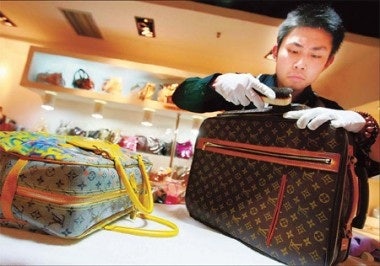Watches Particularly Common Sight At Beijing Pawnshops#

With Chinese New Year gift-giving season hitting its stride over the past couple of weeks, major luxury brands have likely been left smiling as wealthy gift-givers loaded up on watches, wine and jewelry. But another beneficiary that stands to profit from the Chinese New Year luxury spending spree is the humble pawnshop, thousands of which have popped up throughout China in the last decade. As the Economic Observer recently noted in its profile of China's "gift economy," luxury consumption with the intention of gift-giving is part and parcel of the country's holiday celebrations, and has in many ways shaped the Chinese luxury market as a whole since the first stirrings of market economy reforms in the late 1970s. As the article points out, "Gifts have always been the most effective lubricant in human interaction [in China]. In both urban and rural settings, a gift is a means of developing one’s power and profiting in return. The hunger to consolidate power and wealth among the elite and the nouveaux riche has vastly expanded the high-end gift market.
In response to demand for these high-end gifts, we've regularly seen a spike in the limited edition, often China-only offerings by luxury brands both large and small. With the pool of Chinese luxury consumers growing by the year, this has become particularly noticeable since 2009. In the run-up to 2012, the Year of the Dragon -- generally considered a particularly auspicious year on the Lunar calendar -- these localized collections have become more numerous than ever, with watchmakers like Piaget, Glashütte Original and Blancpain joining the likes of Versace, Rolls-Royce, Shui Jing Fang baijiu and Shanghai Tang in emblazoning their products with commemorative dragons. While it's too early to gauge the general reaction in China to these collections -- aside from the Rolls-Royce Year of the Dragon Phantom, which recently sold out despite a US$1.2 million price tag -- we can safely assume that they should go down better than last year's rabbit-infused items.
As the Economic Observer holds, though, following this year's celebrations, many of these high-priced gifts will be destined for the pawnbroker:
The busiest period of the pawn shops is thus right after the Spring Festival, i.e. the New Year holiday. All sorts of unneeded, unwanted and just plain valuable presents are taken to the shops for cash conversion. Since the price of gold has soared in the past two years, it has become once again the most popular and common item to turn in. “Among all luxury goods, watches remain the most common item, especially the famous Swiss ones like Vacheron Constantin, Rolex, Lange and Omega,” says Kai Xin.
Though we hear a great deal more about Chinese pawnshops in the wake of major holidays, they have quietly proliferated for quite some time. As Jing Daily noted in 2010, luxury watches started to show up in pawnshops in Beijing in the mid-’90s, with pawning activity increasing dramatically since around 2000 and creating big business in the Chinese capital and some of the country’s wealthier cities. Cashing in unwanted luxury gifts is not restricted to pawnshops, though, as it's also fueled the growing number of second-hand luxury shops we've seen cropping up throughout China following their boom years in Japan and, later, Hong Kong. As As Zhou Ting, director of the Research Center for Luxury Goods and Services at UIBE, said earlier this month, more ultra-wealthy Chinese looking to sell their high-end goods for quick cash means that the second-hand luxury market should be a segment that enjoys huge industry growth this year.
